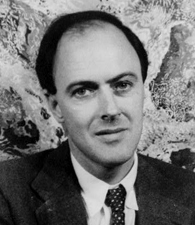Remembered for his bestselling children’s novels, including “Charlie and the Chocolate Factory” and “Fantastic Mr. Fox,” author Roald Dahl’s life was nearly as dark and complex as that of a character in one of his books. An intensely unhappy childhood, adventures as a fighter pilot and intelligence agent in World War II, and a life marked by personal tragedy all provided rich fodder for a lifetime of stories.
Roald Dahl’s Early Days
Roald Dahl was born to Norwegian immigrant parents in Llandaff, South Wales, on September 13, 1916. In his memoir, “Boy: Tales of Childhood,” Dahl describes his boyhood in Wales as dreary and depressing. Both his father and sister died when he was a child, and he performed poorly in school. A schoolmaster once told him he was “quite incapable of marshalling his thoughts on paper.”
Sources in this Story
- The Official Roald Dahl Web Site: About Roald Dahl
- The Daily Telegraph: Roald Dahl was a real-life James Bond style spy, new book reveals
- Style over Substance: Roald Dahl describing his first meeting with C.S. Forester
- IMDb: Roald Dahl
- The New Yorker: The Candy Man
- MedGadget: Water on the Brain
- The Daily Telegraph: Roald Dahl on the death of his daughter
- WalesOnline: My father the big friendly giant
- The Roald Dahl Foundation
- The Roald Dahl Day Website
Notable Accomplishments
During World War II, Dahl was a pilot officer for the Royal Air Force. He survived multiple crashes and hits, which eventually left him physically unable to fly more missions. Afterward, Dahl continued to serve his country—as a spy. Based in Washington, D.C., he secretly encouraged American involvement in the war and also schemed to secure British advantages in plans for the postwar division of international airspace.
During his time in the United States, Dahl was encouraged by C.S. Forester to write about some of his war experiences. His writing career soon took off.
Although he is best known for his children’s stories, Dahl’s early career was spent writing darkly humorous short works intended for adult audiences. His most popular short story was “Lamb to the Slaughter,” a story in which a woman bludgeons her husband to death with a frozen leg of lamb, then roasts and serves the lamb to the police who have come to question her.
Dahl also wrote for film and television, including episodes of “Alfred Hitchcock Presents,” and the screenplay for “You Only Live Twice”; he even hosted his own science fiction TV show, “Way Out,” in 1961.
With the birth of his children came a wealth of new subject matter. “James and the Giant Peach,” a story in which a boy travels inside an immense fruit with a cohort of insects, originated as a bedtime story for his daughters. Other favorites, including “Charlie and the Chocolate Factory,” “Matilda,” “The BFG” and “Danny the Champion of the World” evolved in a similar fashion. According to many estimates, more than 100 million books by Dahl have been sold worldwide.
The Man and his Work
- “Charlie and the Chocolate Factory”
- “James and the Giant Peach”
- “Matilda”
- “The Best of Roald Dahl”
- “Boy: Tales of Childhood”
The Rest of the Story
Dahl’s first son from his marriage to film star Patricia Neal was badly injured when a carriage he was in was struck by a Manhattan taxi in 1960. The four-month-old developed hydrocephalus, or water on the brain, as a result of the injury. Too much fluid in the cranium can put pressure on it and cause brain damage. Dahl helped push for the invention of a device that drained some of the liquid from his son’s brain. The device is still in use today. Theo recovered, but the family suffered another terrible tragedy in 1962 when Olivia, 7, died from encephalitis brought on by measles. In 1965, Patricia suffered a brain aneurysm, and though she survived the aneurysm, she had to undergo intensive physical and occupational therapy.
From 1960 until the time of his death, Dahl lived in a home he dubbed “Gypsy House” in Great Missenden, Buckinghamshire, England. Neal and Dahl divorced in 1983, and later that year, he married Felicity (Liccy) Crosland.
Dahl died on November 23, 1990, at the age of 74. Dahl’s granddaughter, supermodel Sophie Dahl, said he was given a “sort of Viking funeral. He was buried with his snooker cues, some very good burgundy, chocolates, HB pencils and a power saw.”
In 1991, Dahl’s friend and illustrator, Quentin Blake, established the Roald Dahl Foundation. According to the Foundation’s Web site, its mission is “Doing wonkalicious things. Providing practical support for children with brain, blood and literacy problems.” Dahl’s legacy is also preserved through Roald Dahl Day, celebrated on his birthday.
Related Links
- Roald Dahl’s Creative Life, On and Off the Page
- Wes Anderson Reemerges With “Fantastic Mr. Fox”
- Becoming Maurice Sendak: A Children’s Author Grows Up











